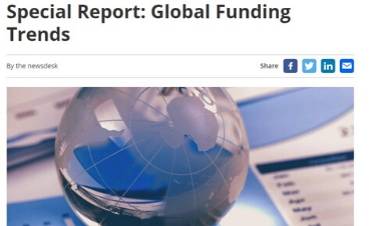Sarah Richardson, Group Editor, Research Professional News
Medical research charities have been making headlines for reasons other than the battle against COVID-19, in the form of an ambitious partnership between the US government’s main agency for cancer research and leading British charity Cancer Research UK.
The partnership between the charity and the US National Cancer Institute will offer large grants to multinational teams over the next decade to address “critical roadblocks in research.” A number of possible challenges are being considered, ahead of an announcement on the final set in October.
Announcing the scheme, Cancer Research UK chief executive Michelle Mitchell underscored that “COVID-19 has delayed progress and impacted cancer patients everywhere,” saying this made it “even more important for researchers to come together to tackle problems that are too big for any one institution or country.”

Major charities like Cancer Research UK and the British Heart Foundation are expecting to lose 40 to 50 percent of their income this year.![]()
Cancer, like COVID-19, is an international challenge, and initiatives that bring about an international research response to it are hugely welcome. But at the same time as research leaders have been welcoming the new partnership, there have been growing fears over the sustainability of the work of leading medical charities like CRUK as a result of the pandemic.
Paul Nurse, director of the UK’s Francis Crick Institute, said last week that biomedical research charities in the country were facing “an existential crisis,” with high street charity shops being closed during lockdown and large-scale fundraising events abandoned. In an interview on national radio in the UK, he said that “major charities like Cancer Research UK and the British Heart Foundation are expecting to lose 40 to 50 percent of their income this year.”
The crisis facing charity research funders is being replicated around the world, with funding shortfalls causing clinical trials to be stopped or delayed and research teams being broken up.
Nurse has called on the UK government to provide a level of match-funding for medical charity research over the next three years to mitigate the losses. An international effort along these lines would surely be even better.
COVID-19 Global News Round Up
Here are the latest headlines in COVID-19 research policy and funding, from our team of journalists at Research Professional News.
Worldwide
The director general of the World Health Organization has implored countries around the world to join a global initiative on equal access to COVID-19 vaccines, warning that “we need to prevent vaccine nationalism.”
United States
The White House has told federal agencies and departments to prioritize public health research and innovation when they allocate their budgets for the next two years.
Europe
Health experts are calling on the EU to fund the development of a range of treatments for COVID-19, rather than focusing excessively on the development of relatively well-funded vaccines.
Agreements to secure doses of COVID-19 vaccines for the EU will protect the manufacturers from some potential legal claims and damage payments they could face if the vaccines cause harms—potentially as a result of the speed with which they are being developed—the European Commission has said.
The European COVID-19 Data Platform—a website launched by the European Bioinformatics Institute, European Commission and other partners—is playing an important part in the research response to the pandemic, those behind it have said. The European Commission has registered a European Citizens’ Initiative petition calling for the pooling of COVID-19-related intellectual property developed with the support of EU funds.
In university news, a slight increase in coronavirus infections has caused disruption for Norwegian universities, who had expected to return to on-campus teaching in autumn.
The European Commission has allocated another €200 million to the EU’s Erasmus+ mobility scheme for 2020, to boost the program in response to COVID-19.
United Kingdom
Pressure is mounting on the UK government to update its guidance on face coverings in universities, as institutions take matters into their own hands ahead of the start of the academic year. The University of Essex has said it believes in-person teaching can be safe, after dozens of researchers called for the institution to abandon any plans for face-to-face contact in the new academic year as the COVID-19 pandemic continues.
Funders UK Research and Innovation and the National Institute for Health Research have announced a joint £8.4m investment in three studies investigating major unanswered questions related to coronavirus immunity.
Applicants to UK Research and Innovation’s rapid response call for COVID-19 projects have complained of delays after some researchers waited three months for a verdict on their bids.
And the UK’s largest public funder of research is under pressure to review how it makes funding decisions, following concerns over how it awarded grants to investigate the COVID-19 risk among ethnic minority groups.
Africa
South African universities will be expected to begin the 2021 academic year between 15 March and 15 April, but many will struggle to make that deadline. Meanwhile, female scientists are suffering from the African response to the COVID-19 pandemic, and worse may still be ahead.
Africa is coping with COVID-19 despite predictions that the continent would be overwhelmed, a panel discussion has heard. And South Africa’s embattled science system may be able to look forward to a silver lining in the economic recovery plan being put together for the country.
South Africa’s higher education minister has said that no current infrastructure projects at universities will fall victim to COVID-19 budget cuts.
Australia
The revival of Australia’s AUS $19.5 billion international student industry may hang on a trial due to commence in South Australia next month.
You can follow daily breaking news on higher education, research policy and funding at ResearchProfessonalNews.com.
September 3, 2020






